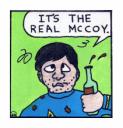Fri 25 Sep 2009
Plato On The Sinking Of McDonaldland
Posted by laup under Backwater, Discussion, Meditations, Outbreak
Comments Off on Plato On The Sinking Of McDonaldland
In the computer game Civilization 3, you can play a number of rulers during ancient times. You can, for example, play the Sumerians and develop things like chariots and mining. One of the civilization advances I found most interesting in that game was “worker housing”.
Basically, you develop the ability to concentrate labor into immense camps. It’s the prototype of the company store idea. Workers eat, sleep, and raise families in these camps so you can have them concentrate their efforts on building things you want your city to have.
See, the rulers didn’t have construction machinery to control yet. All they had was physical labor. The only way to say, build huge monuments to your greatness, was to find an efficient way to gather workers together and keep them moving at a large-scale, steady pace. These may have been the first attempts at industry.
This is based on real discoveries. For example, in Egypt they found the remains of large camps of worker housing that were likely used to build the pyramids.
Now that we have fossil fuel powered machinery and access to tremendous energy, we don’t need worker housing for industry. Or do we?
I would say that advances have allowed industry to expand to a point where worker housing as a concept applies across a broader field of vision. We might not need a camp of thousands of construction workers, but we do need cities composed of teams of workers and their associated support staff. If you ever read Richard Scary’s What Do People Do All Day? You can get a sense for how complicated and interrelated each “worker” is.
I look at fast food places. They exist to give people access to cheap, quick food. In and out so you can gobble down something for lunch, or feed your family when people are too tired or time-stretched to cook. Places like McDonald’s, Burger King and Taco Bell exist to keep the workforce fed so they can be kept working as much as possible.
In other words, these establishments exist as a room in today’s “worker housing”. Instead of building pyramids we’re mining coal, driving trucks, filing papers and cleaning restrooms to keep the industrial system going.
What’s this industry building, besides massive fortunes for a lucky few? Maybe a kind of unconscious, worldwide tower of Babel. Hrm. I think I shouldn’t have eaten that last chicken soft taco.
This effort is supported by cheap, abundant energy in the form of oil. An oil supply which has reached the peak of production and will now slowly recede like a tide. Unless we start a new Manhattan-sized project and invent an entirely new form of energy that’s never been known before, that energy is going to disappear from the system. Nothing we have will replace oil’s scale of energy and versatility — not coal, not nuclear, not solar or whatever else “process” we have on the blackboard right now.
What this means is the end of fast food.
When oil becomes scarcer (and therefore more expensive), the cost of petrochemicals will increase. That affects the use of countless things. Fertilizer and pesticides used to grow the crops that feed the cattle that go into your burger. The electricity that powers the factory that processes the corn syrup in your drink. The diesel that fuels the trucks that deliver the processed food packages used to make your burrito. The feedstock used to manufacture the plastic of your large drink cup.
It simply will not be cost-effective to maintain networks of fast food. I mean, I look at all the KFCs, Pizza Huts, and Subways and I see obsolescence gnawing at their foundations like a hungry badger. The Happy Meal is going to turn into a high-priced collector’s novelty like an eight track tape. Then it’s going to be something you get tired of hearing Grandpa ramble on about, all the way into a topic you learn about in history class.
That doesn’t mean some new form of worker housing won’t take the place of the current model. We will always have oil, just not enough to keep the old model going. Any change is likely to be a slow, gradual process. We might even get really lucky and discover a new energy source to help with the transition into the post-oil age. Whatever ends up happening, we’re in for some adjustments.
So enjoy your chicken-farm nuggets and processed slopper sandwiches. The limits of growth inherent in the laws of nature are going to wipe out what decades of awareness activism couldn’t accomplish.



